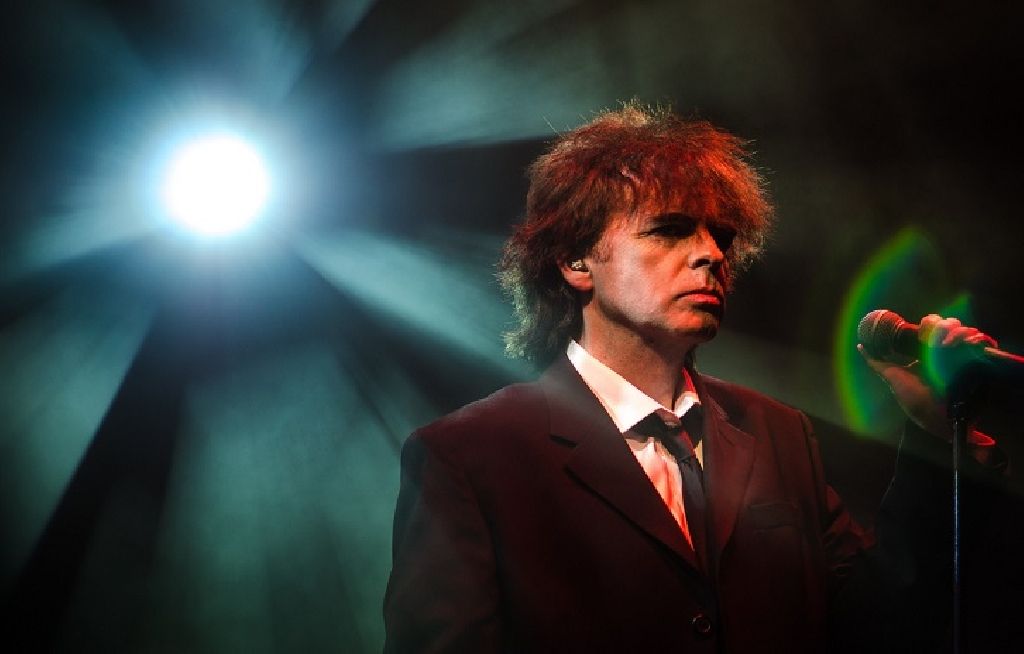
Peter Nicholls Interview
Peter was recently interviewed by Brazilian website '80 minutos':
Peter, "The Road Of Bones" was released in 2014 and it is considered by many as the best IQ album. Do you see it the same way? Are you still proud of the album?
Yes, I think it’s a very strong album. We obviously had a lot to prove, as it was the first IQ album without Martin Orford, and a new line-up of the band with Tim and Cookie back on board, and Neil playing keyboards. We were focused and we knew what we had to do. Everyone will have a different opinion about what qualifies as the best IQ album but “The Road Of Bones” is definitely up there, in my view. It’s been very successful for us, both critically and commercially.
Are there any updates from your next studio release? Anything you can share with us?
We’re working on it now and have already recorded quite a lot of material. We’re notoriously slow workers because we take a lot of care over what we do. For me, the albums are the most important aspect of IQ, they will still be around long after the band has finally called it a day, so they have to be the best we can make them at the time. The new album should be released next year.
After such a successful release like "The Road Of Bones", did you guys talk about which musical direction to take after that?
Yes, we’ve discussed the kind of album we want to make. I’m keen for it to continue some of the harder, more aggressive elements of the last album. I don’t want us to get soft, now that we’re veterans of the music scene! We aim to surprise our audience, I wouldn’t want people to know what to expect from a new IQ album.
Here’s a question directed to your new fans: how would you describe IQ's sound?
We play progressive music and I guess some people have a preconception of what that music must be. There are certain trademarks that we incorporate in our sound but we never write in a conscious style, we try not to do what we think people would expect of us. We have an ‘IQ sound’ which we’ve developed and established over the years, and we’re proud of that, but we’re always looking to expand the scope of what we do.
Peter, let's talk a little about the band's past. Could you tell us how you guys got together in the eighties to form IQ?
Mike and I originally met in 1976 at a Genesis concert on the ‘Trick Of The Tail’ tour. At the time, we were living at opposite ends of the country and it was only by chance that we were sitting outside near each other, waiting for the doors to open. It’s scary to think how much has followed from that chance meeting – the band, obviously, but also so much of my personal life, friends I’ve made as a result of being in IQ.
An instrumental band, The Lens, formed a year or so later and although I was technically a member there wasn’t anything for me to do! After The Lens split in 1981, Mike and Martin formed IQ and recruited Tim on bass. I’d put together a band and we played only one gig, which Mike came to. The next morning he asked me to join IQ and eight days later, in June 1982, I played my first show with IQ! Paul joined on drums the next month. It all happened very quickly, looking back.
Do you still like the band's first releases "Tales From The Lush Attic" and "The Wake"? How do you see them with the experience you have today? Do you revisit some of the oldest material from time to time or when writing new music?
I’m still very fond of those albums, they were a crucial part of the early years of the band. We recorded and mixed “Lush Attic” so quickly, in just five days. That would be completely unheard of nowadays. Our influences are there for all to hear on that album but I think the music still holds up, 35 years later.
I feel we found our own sound very quickly, and that happened on “The Wake”. I think the vocals sound terrible on that album and I would love to re-record them all, but it was an album of its time and it captures perfectly where IQ was in 1985. Those albums are a million miles from being perfect but they both work well, I think. We still occasionally perform songs from them live.
After the release of those two albums, you left the band and released the album “In Sheltered Winds” with Niadem's Ghost. Could you tell us a little about that period? What can you say about the album?
It was an experimental time for me. After leaving IQ, I knew I still wanted to be involved with music and I knew I wanted to try something different musically. “In Sheltered Winds” wasn’t like IQ at all, I don’t think. I probably lost some IQ fans because of that and maybe gained some people who felt it was something new. Niadem’s Ghost was very short-lived really, only a couple of years. It was hard work starting again, gigging to build up an audience and in the end it kind of imploded because it wasn’t getting anywhere. We did some great music which I still like. “Endless Times” is still one of my favourite songs that I’ve been involved in writing. Not all of the music worked, but that’s the nature of experimenting and not playing it safe.
Coincidentally or not, IQ released two low rated albums called "Nomzamo" and "Are You Sitting Comfortably?" without you. After that period, you returned to the group and together released the great album "Ever", followed by the amazing "Subterranea". Were you guys in a great place back then?
“Ever” was an exciting album to make. We were re-establishing IQ and the music came naturally. Writing “Subterranea” was a very creative time for us, we knew we wanted to devise a new show to support the new album, and we all worked closely together with our crew to make that dream come true. It was a huge project and one that I’m enormously proud to have been a part of.
And after "Seven Stories into '98", the band released three amazing albums: "The Seventh House", "Dark Matter" and "Frequency". Another great period for the band, right?
Yes, I think so, they’re all strong albums and they still hold up today. “Frequency” was a strange time for us as Paul Cook had left the band and we had Andy Edwards on drums, and then Martin left halfway through the recording process. After that, I was ill in hospital with pneumonia and convalescing for a long time, so I wasn’t sure if my voice was still going to work when I eventually got back in the studio. Mike and I worked together closely at that point, which I enjoyed. I was very relieved when the album was finally finished. It has some of my favourite songs on it.
Many people compare the amazing track "Harvest of Souls" from "Dark Matter" with Genesis "Supper's Ready". Do you agree? Was that intentional?
No, not at all. We never set out to deliberately write a long song, they just evolve that way. Some songs feel good at 7 or 8 minutes, and some feel like they still have more to say and they go on longer. I can see why people make those comparisons, there’s one section that is, I suppose, quite reminiscent of “Apocalypse In 9/8” but it definitely wasn’t consciously written that way. “Dark Matter” is a slightly difficult album for me personally, I don’t connect with it as closely as I do with other albums.
Have you ever looked at the past and compared how the band sounded in those early days and how it sounds today, especially on stage?
On stage, we were much rougher than we are now, especially in the early days when we had no on-stage monitoring and not much in the way of a PA. We didn’t have a sound engineer doing our outfront sound, it was really hit and miss. I often couldn’t hear myself and tended to over-sing in order to hear what I was doing. It’s light years away from that now. We all use in-ear monitors and are able to control our individual on-stage mixes so we can each hear exactly what we need to hear. From my perspective, it means I don’t have to push my voice as hard so I sing more accurately and my voice lasts longer!
What is the process that the band uses to make music? Do you take care of lyrics and vocal melodies only or you also contribute with riffs and other musical ideas?
The music always comes first. I write all the lyrics which I enjoy doing, though I must admit I’m brilliant at leaving it till the last minute! I’m very good at getting distracted. Most of the musical ideas are generated by Mike and he generally has a pretty clear idea of how he imagines the song will sound but we all make our contributions, which I think is very important. Mike usually comes up with a basic idea for a vocal melody but obviously it can change when I have the lyrics and I add my input.
Have you ever thought about releasing a side project like a solo album?
No, I don’t think that would happen. Occasionally I think about how a solo project might take shape, what kind of music it would be and who I’d like to work but, right now, I don’t see it happening. I have limited time and I prefer to concentrate my energies on IQ.
I need to praise the IQ album covers that you have painted. Is painting still a hobby to you? How about painting the new album cover?
Thank you very much, that’s very kind of you. It was always a great thrill for me to see my artwork on the cover of an IQ album but I must admit, I do very little artwork these days. I worked as an illustrator for several years but I don’t do that anymore. When we released “Subterranea” I felt it needed a different kind of approach for the cover, something more photographic. I don’t have any plans to do the artwork for the next album but you never know
Can you please name your top three IQ albums?
In no particular order:
1. “The Wake”
2. “Subterranea”
3. “The Road Of Bones”
The concept of our website is to allow users to rate and report their experience during the 80 minutes of listening to a music album. Could you tell us the last non-IQ album you recently heard that is worth recommending?
Some of my current favourites:
1. Public Service Broadcasting: “The Race For Space”
2. David Bowie: “Blackstar”
3. Kristina Train: “Dark Black”
4. The Motels: “The Last Few Beautiful Days”
5. Imagine Dragons: “Origins”

